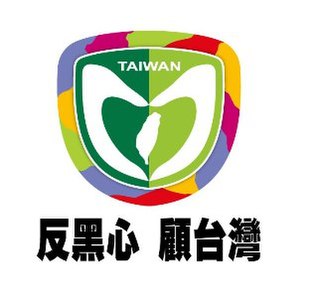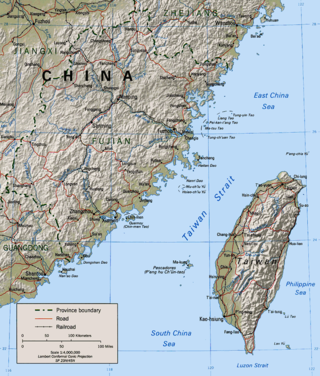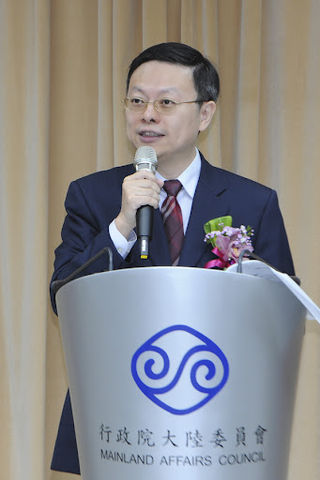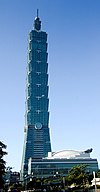
The Straits Exchange Foundation is a semiofficial organization set up by the Government of the Republic of China (Taiwan) to handle technical and/or business matters with the People's Republic of China (PRC). Though technically a private organization, it is funded by the government and under the supervision of the Mainland Affairs Council of the Executive Yuan. Its role is effectively to function as the de facto embassy to the PRC, as a means of avoiding acknowledgement of the PRC's statehood status.

This is a timeline of the Republic of China.
The 1992 Consensus is a political term referring to the alleged outcome of a meeting in 1992 between the semiofficial representatives of the Chinese Communist Party (CCP)-led People's Republic of China (PRC) in mainland China and the Kuomintang (KMT)-led Republic of China (ROC) on Taiwan. They are often credited as creating a diplomatic basis for semi-official cross-strait exchanges which began in the early 1990s and is a precondition set by the PRC for engaging in cross-strait dialogue.

Chen Deming is a former the President of Association for Relations Across the Taiwan Straits of the People's Republic of China.
Referendums in Taiwan at both the national and local level are governed by the Referendum Act of Taiwan, which was enacted by the Legislative Yuan in December 2003. Citizens can propose laws via referendums at the national and local levels. The Referendum Act also allowed people to make changes or abolish laws by referendums.

Chen Yunlin was the chairman of the Association for Relations Across the Taiwan Straits (ARATS), the body responsible for negotiations with Taiwan in the People's Republic of China in 2008–2013.

The 1025 demonstration(Chinese: 1025反黑心顧台灣大遊行; lit. 'October 25 Opposing Evil Minds and Looking out for Taiwan March') was a demonstration on 25 October 2008 sponsored by the Democratic Progressive Party (DPP) and Taiwan Solidarity Union in Taipei, Taiwan. This protest march was launched five months after the inauguration of President Ma Ying-jeou and was preceded by an earlier 30 August 2008 protest in August which focused on Ma's failing economic plans.

The 517 Protest was a protest that took place on 17 May 2009 in Taipei and Kaohsiung, Taiwan. The event vented anger at President Ma Ying-jeou for China-friendly policies that were seen as compromising Taiwan's sovereignty.
The Second Chen–Chiang summit was part of a series of the Chen-Chiang summit of cross-strait meetings. It was the first major meeting between the Association for Relations Across the Taiwan Straits (ARATS) and Straits Exchange Foundation (SEF) leaders in Taiwan. The meeting lasted from November 3 to 7, 2008 in Taipei, Taiwan.
The Fourth Chen–Chiang summit was part of a series of the Chen-Chiang summit of cross-strait meetings held at Taichung, Taiwan. It was a meeting between the Association for Relations Across the Taiwan Straits (ARATS) and Straits Exchange Foundation (SEF).
The Economic Cooperation Framework Agreement Television Debate was a televised debate between the President of the Republic of China, Ma Ying-jeou, who is also chairman of the Nationalist Party (Kuomintang), and the chairperson of Democratic Progressive Party, Tsai Ing-wen, which aired on April 25, 2010.
The First Chen–Chiang summit was the first of a series of what would later become the Chen-Chiang summit of cross-strait meetings. The meeting was held between the Association for Relations Across the Taiwan Straits (ARATS) represented by Chen Yun-lin and Straits Exchange Foundation (SEF) represented by Chiang Pin-kung. This meeting followed the 1993 Wang-Koo summit.

The Fifth Chen–Chiang summit (第五次陳江會談) was part of a series of the Chen-Chiang summit of cross-strait meetings between China and Taiwan. It was held between the Association for Relations Across the Taiwan Straits (ARATS) represented by Chen Yun-lin and Straits Exchange Foundation (SEF) represented by Chiang Pin-kung.
The Sixth Chen–Chiang summit is the 6th part of the Chen-Chiang summit of cross-strait meetings. It is held between the Association for Relations Across the Taiwan Straits (ARATS) represented by Chen Yun-lin and Straits Exchange Foundation (SEF) represented by Chiang Pin-kung.

Lin Join-sane is a Taiwanese politician. He was the chairman of the Straits Exchange Foundation from 27 September 2012 until 20 May 2016.

Wang Yu-chi is a Taiwanese politician. He was the Minister of the Mainland Affairs Council (MAC) of the Executive Yuan since 28 September 2012 until 16 February 2015, when he resigned over the dropping of espionage charges brought against Chang Hsien-yao. Wang is the first ROC ministerial-level government official to visit mainland China after the end of the Chinese Civil War in 1949.

Chang Hsien-yao or Vincent Chang is a Taiwanese politician. He was the Special Deputy Minister of the Mainland Affairs Council of the Executive Yuan in September 2013 until August 2014 and concurrently as the Vice Chairman and Secretary-General of the Straits Exchange Foundation (SEF) in February 2014 until August 2014.

Su Chih-fen is a Taiwanese politician. She was the magistrate of Yunlin County from 20 December 2005 until 25 December 2014.
Events from the year 2014 in Taiwan, Republic of China. This year is numbered Minguo 103 according to the official Republic of China calendar.

Julian Kuo is a Taiwanese political scientist and politician who first served in the Legislative Yuan from 2002 to 2008 and was reappointed to the office from 2016 to 2020.














